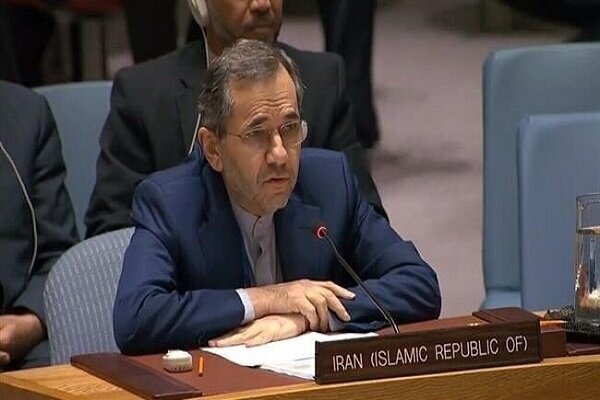
TEHRAN, (MNA)– Iran's Ambassador and Permanent Representative to the UN said that “we support the cross-border aid delivery in Syria, provided that it is renewed in a balanced manner and addresses the Syrian government's legitimate concerns.”
Majid Takht Ravanchi’s speech on “The situation in the Middle East: (Syria)” at the United Nations Security Council is as follows:
Mr. President,
I thank the UN Special Envoy for his briefings.
As we have frequently stated, there is no military solution to the Syrian crisis. The resolution of this crisis must be peaceful and in accordance with the principles of international law, particularly the full respect for national sovereignty and territorial integrity of States. The end of the occupation and the restoration of Syria's full sovereignty are essential prerequisites for achieving this goal.
The violation of Syria’s sovereignty and territorial integrity continues to persist either through the occupation of certain parts of the country, the Israeli aggression, or terrorist attacks.
We once again reject separatist activities or illegitimate self-rule initiatives in Syria and condemn any effort to support these illegal measures.
On the political level, we underline the Constitutional Committee's crucial contribution to the political process of the Syrian crisis and commend the UN Special Envoy’s efforts to facilitate the 8th round of the Constitutional Committee meeting.
Our delegation was in Geneva, actively interacting with all sides in order to help this process move forward. We welcome the announcement on the upcoming meeting of the Constitutional Committee to be held from July 25 to 29.
We reiterate our constant position that the Committee must operate in strict conformity with its Terms of Reference and Rules of Procedure, free from outside intervention, pressure, artificial deadlines, or any other circumstances of similar nature. The UN's participation must also be limited to facilitating this process. Ultimately, it must be a truly Syrian-led and Syrian-owned process.
In their joint statement earlier this month, the Astana format guarantors reiterated their commitment to advancing a workable and long-lasting political process that is led and owned by the Syrian people in accordance with UN Security Council Resolution 2254.
Iran will continue its serious contribution to the efforts related to the release of detainees, and in this regard, calls on all parties to cooperate for the realization of this noble humanitarian endeavor. The recent declaration of general amnesty issued by the Syrian President is a valuable contribution to the achievement of peace in Syria.
Mr. President,
In light of the dire situation in Syria, the provision of humanitarian aid is essential, and political circumstances should not prevent humanitarian aid to reach the people in need. This must, however, be done with full respect for Syria's sovereignty, territorial integrity, and national unity.
We support the Syrian government's full cooperation with the United Nations and numerous humanitarian organizations involved in cross-line aid delivery in Syria.
We also support the cross-border aid delivery in Syria, provided that it is renewed in a balanced manner and addresses the Syrian government's legitimate concerns. In this context, the implementation of early recovery projects is of high priority bearing in mind the importance of providing essential services to the people in need. Furthermore, illegal unilateral sanctions should have no bearing on the implementation of early recovery projects.
Mr. President,
We strongly condemn Israel's repeated violations of Syria's sovereignty and territorial integrity, including recent terrorist attacks on civilians and civilian infrastructure, particularly the attacks on Damascus International Airport on June 10th, which resulted in the cancellation of all flights, including humanitarian flights.
The Security Council must unequivocally condemn the Israeli aggression and terrorist attacks against Syria. We recognize Syria's legitimate right to self-defense under international law and the United Nations Charter.

No comments:
Post a Comment